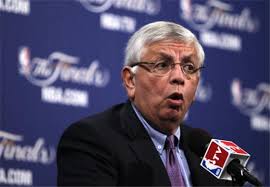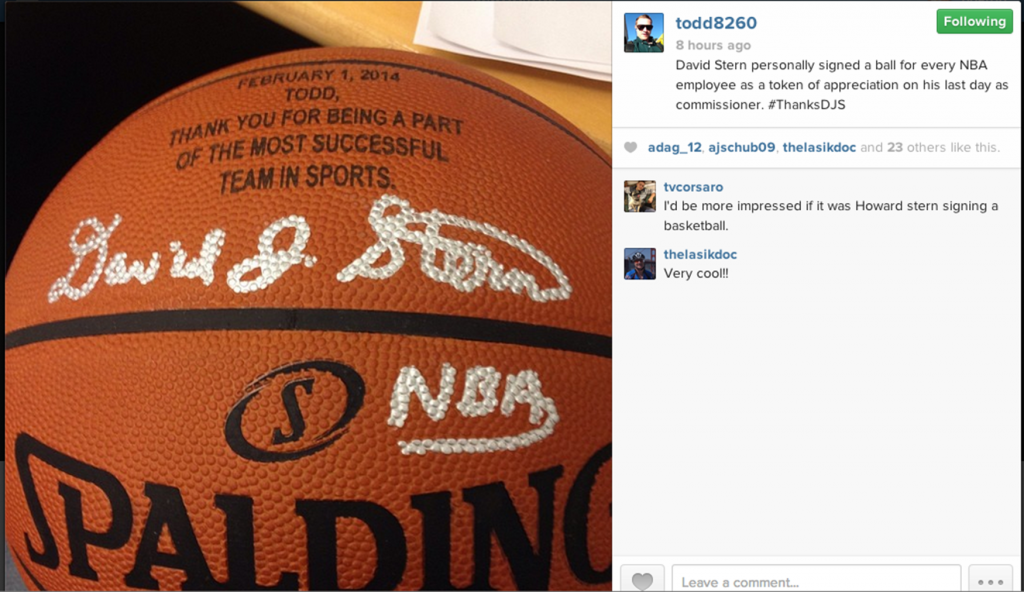 Saturday marks the end of one of the NBA’s most profound era’s.
Saturday marks the end of one of the NBA’s most profound era’s.
Not the “Jordan” era.
Not the “LeBron” era.
Saturday, February 1st marks the end of the “David Stern” era.
While most of today’s on-court headlines have been given to the unsuccessful Cleveland Cavaliers, the legacy of David Stern will be remembered as one of the most successful stories in sports history. More from ESPN’s NBA team:
One aspect of David Stern’s reign as NBA commissioner is the indelible personal mark he put on things. It wasn’t just the actions, it was the way in which they did it. These moments often reflected as much of his personality, manner and leadership style as they impacted the league. While you can debate whether another commissioner of this age accomplished more, there’s no doubt that he displayed more attributes — imperious, sarcastic, compassionate, ruthless, among them — than his contemporaries. — J.A. Adande
Adande and his ESPN colleagues chronicle the many traits Stern so ably displayed over the years that helped him impact the league on every level. These include his ability to relate to players, unabashed political views, merciless anger, uncanny loyalty and his legendary negotiating skills.
As I was gathering my things to go to the court floor just before the game, I felt a hand on my shoulder in the corner of the media room. I turned around to find Commissioner Stern looking me in the eye. I was taken aback to say the least. He’d found me to say how happy he was that I was there and how, over the summer, he’d been worried about me and kept tabs on my condition.
He spent a few minutes with me while some of his subordinates waited at the door nervously. He was holding up the ring ceremony because he saw me and was pleasantly surprised that I’d made it there. — Brian Windhorst
Stern’s ability to affect everybody associated with the NBA, from his players to GM’s to coaches to the media to his very own office colleagues was something that made him the most recognizable sports commissioner.
But that all changed with David Stern. One reason the NBA has become so incredibly popular, one reason its players are the most recognizable athletes on the planet, is because under Stern, the league marketed individuals.
From a basketball standpoint, that marketing strategy may not have been the game’s best friend, as many would argue that team play has declined over the years. But from a business standpoint, it was pure gold.
Just think about it: Nowadays, practically every team has a marquee name. That player may not have a marquee-quality game, but his name recognition makes him a draw at the box office. The Sacramento Kings are pretty sorry, but we all want to watch DeMarcus Cousins play. Detroit is pretty weak, but Brandon Jennings, Andre Drummond, Greg Monroe and Josh Smith are all guys hoop fans want to see. Before the Clippers became a legitimate NBA franchise a few years ago, they always seemed to have a player or two whose name alone could entice fans to buy a ticket: Lamar Odom … Darius Miles … Eric Gordon.
And most of all, Stern will be remembered as a leader. He took the NBA from the days of tape-delayed Finals games to the second most viewed sport in America, and competing to be the most played sport across the globe. That is because of Stern’s vision.
It’s now customary for star players to make visits to Europe and China in the offseason to promote the league and their brand. Because of Stern, players are able to promote their brand.
Over half of the NBA’s teams played international preseason games this year. And let’s not forget that the Atlanta Hawks and Brooklyn Nets played in London just last week.
Tomorrow, on February 1st (30 years plus one day) to Stern’s induction as the NBA commissioner, he will step down and pass the torch to Adam Silver, the NBA’s Deputy Commissioner since 2006.
 By all accounts, Silver is the man for the job.
By all accounts, Silver is the man for the job.
Two high ranking NBA executives and a close friend of Stern told me this today without hesitation.
Silver started with the NBA in 1992, working directly with Stern as his special assistant. A position he was able to get by having the gaul to send Stern a letter asking for career advice.
Several years prior, let’s say 30 years ago, when Stern took over, the league was a 23-team glorified circus. Franchises were declaring bankruptcy. This is not the same league that Silver will inherit. Silver will not get a league where one could buy a team for $15 million.
Try $500 million.
Just after Stern became commissioner, the Denver Nuggets sold for $20 million in 1985.
Just four years later they sold again, only this time for $65 million.
Last year the Sacramento Kings, a train wreck of a franchise for the past decade, sold for a record $534 million.
The league now employees over 1,100 people in 15 offices globally.
The number of international players when Stern took over was in single digits, and now you can find several on every team.
This is a star and celebrity driven league now, and that is something Stern was able to envision, build and embrace — and profit from — more than anybody. Stern was able to own it, which seems vague, but that’s just how he was. Continuing that path will be Silver’s challenge, who is a much more low-key, “corporate” figure.
There have been four NBA commissioners: Maurice Podoloff (1946–1963), Walter Kennedy (1963–1975), Larry O’Brien (1975–1984), David Stern (1984–2014).
And now, Adam Silver.
No commissioner other than Stern has held the position for more than 17 years.
Will Silver be able to replicate the success of Stern over his tenure as commissioner?
If he’s still in Stern’s seat 30 years from now, we’ll have our answer.
Onto more from around the NBA
